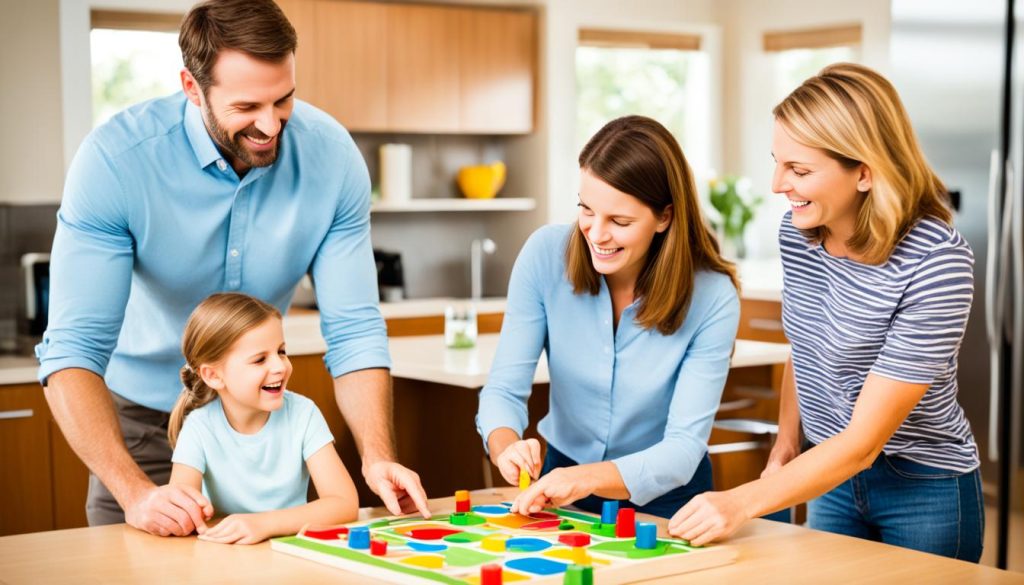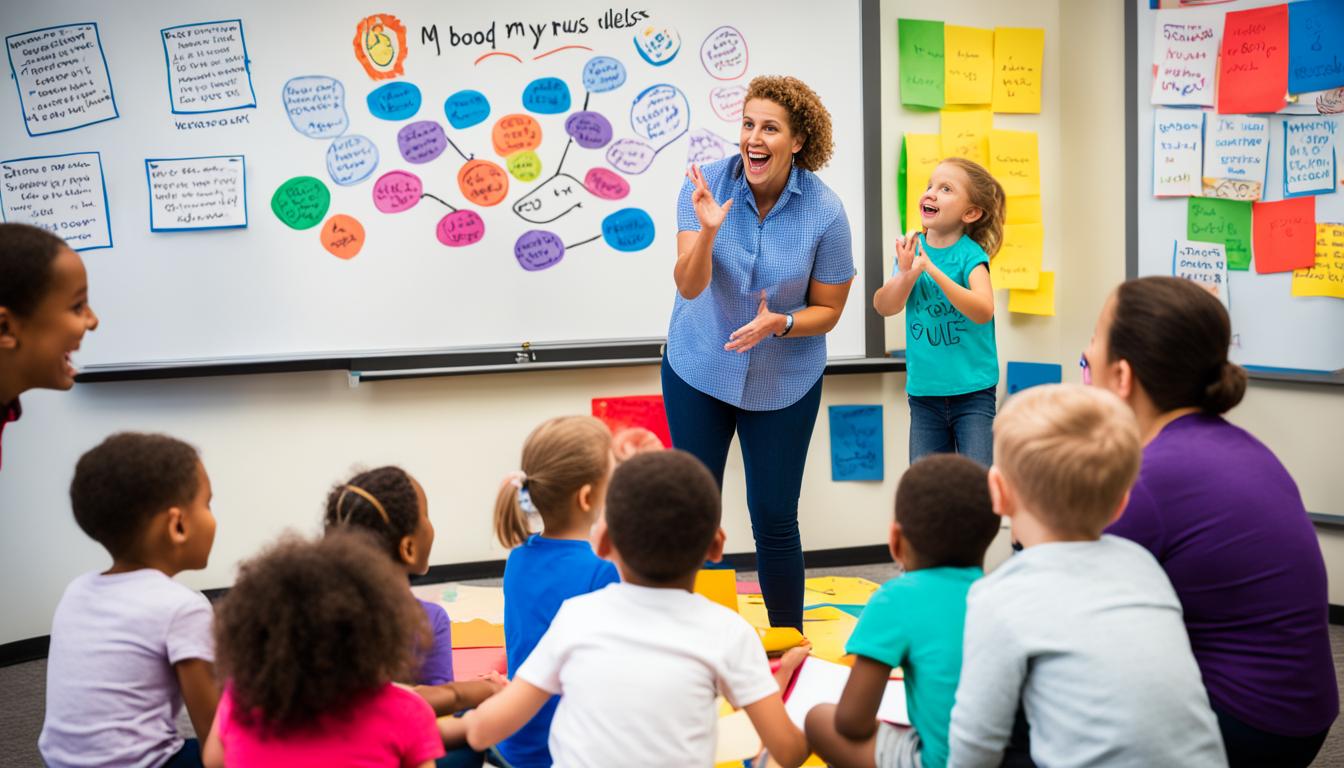Parents and caregivers have a big job. They must teach young ones about consent and personal space. Imagine your child saying “No” clearly and standing up for themselves. This comes from teaching them to understand their feelings and value their own space early on.
By doing this, you help them handle their bodies and interactions with others in a responsible way. It’s about being brave and clear about what they’re okay with.
Think back to when you were a kid. How different would things have been if you could say “No” and make your own choices? Teaching kids to speak up and respect their bodies is key. It keeps them safe and builds their confidence and understanding of others.
Actions like not forcing hugs or kisses and offering other ways to say hello are important. They show kids that they have the right to decide what’s okay for them. This is crucial for their growth and learning about respect and responsibility.
Key Takeaways
- Fostering emotional intelligence in children for recognizing and asserting personal boundaries.
- Building self-esteem by allowing kids to make decisions about their own bodies.
- Effective parent-child communication is crucial for teaching consent and personal boundaries.
- Positive parenting techniques help children to understand and practice respect for themselves and others.
- Teaching kids responsibility by allowing them to express comfort levels with physical affection.
Your role in teaching your child about their body and boundaries is crucial. It helps create a safer, more caring world for them.
Understanding the Importance of Consent and Personal Boundaries for Kids
Teaching kids about consent and personal boundaries is key to their growth. It helps with Child Development Milestones, Encourages Child Creativity, and Supports Child Mental Health. Let’s see why it’s so important.

Why Consent Matters
Kids who learn about consent know they control their bodies. This is vital as most kids face situations where friends keep asking for things they don’t want. Teaching consent helps them say when they’re uncomfortable. It builds their self-worth and is key for a respectful, safe world.
The Role of Boundaries in Child Development
Setting personal boundaries is a big step in growing up. Kids usually learn about boundaries by age 7.67. Having clear boundaries helps them grow emotionally and mentally. It lets them say “no” and be in control, whether it’s sharing toys or setting social limits.
| Aspect | Statistics |
|---|---|
| Average Age of Learning Boundaries | 7.67 years old |
| Children Facing Persistent Requests | 100% |
| Books Recommended to Teach Boundaries | 14 |
| Options for Responding to Requests | 5 |
| Action if Boundaries Are Not Respected | Seek help from a trusted adult |
| Parental Support for Setting Boundaries | 100% |
Establishing Trust and Safety
Trust and safety are crucial for kids’ mental health. Teaching consent and boundaries shows them they have the right to their space. It gives them tools to stand up for themselves. Parents are key, supporting their kids by setting examples and helping out when needed.
Modeling Consent and Asking for Permission
Teaching kids about consent and respect is key to setting boundaries. By showing them how it’s done, you help them learn these important values. It starts with everyday actions and talks.

Leading by Example
Leading by example is a great way to teach consent. Ask your kids for permission before touching them, like hugging or tickling. This shows them the value of respecting each other’s space. It helps them understand that consent is key in all interactions.
Talking about your actions, like getting dressed or brushing teeth, helps kids see their independence. Asking to enter their room sets a good example. It teaches them to set and respect boundaries.
Practical Ways to Ask for Permission
Asking kids for permission can be part of daily life. Asking “Can I give you a hug?” or “Is it okay if I help you with this?” lets them share their feelings and make choices. It respects their freedom and builds a strong foundation for respect.
- Encourage children to ask their peers before borrowing toys.
- Model respectful behavior by asking before taking their belongings.
- Use teachable moments, like storytime, to discuss characters respecting each other’s space.
Using these strategies in parenting is also a good way to discipline. If a child doesn’t ask before entering someone’s space, remind them why it’s important. This helps them understand boundaries and prepares them for social situations.
Teaching Kids They Are the Boss of Their Bodies
Teaching kids they control their own bodies is key for their safety and nurturing their creativity. It gives them the confidence and respect they need to move through the world safely.

Even toddlers can learn about controlling their bodies. This lesson helps protect them from abuse and builds their understanding of consent. Teaching kids it’s okay to say “no” is a big part of this education.
By teaching kids to respect each other’s boundaries, you help them grow in all areas. As they get older, they’ll understand personal space and respect. School-age kids are especially open to learning these important lessons.
Learning about body autonomy helps kids speak up when they’re uncomfortable. This is crucial for everyone, no matter their gender or age. Being able to say what they feel leads to better relationships and stronger communities.
The Girl Scouts say kids shouldn’t be forced to hug or kiss if they don’t want to. This shows how important consent is, even with family. It starts important talks about kids having control over their own lives.
Using the right words to talk about body parts helps kids feel empowered. Experts agree that using real terms helps kids report bad behavior better.
Parents make choices, like not piercing their kids’ ears, to let them decide later. These choices show how important it is to let kids make their own body decisions.
| Age Group | Learning Focus | Outcome |
|---|---|---|
| Toddlers | Basic body autonomy | Reduced risk of abuse |
| School-age children | Personal space & boundaries | Enhanced social development |
| All genders/ages | Consent education | Ability to speak up |
Respecting their bodies helps kids make smart choices, leading to better child nutrition and development. It boosts their creativity and sets them up for a confident future.
Empowering Kids to Identify Safe Adults
Teaching your kids to spot safe adults is key to their safety and happiness. Safe adults are those who make your child feel safe and valued. Knowing who these people are and how to talk to them can make the parent-child bond stronger. It also helps build a home full of respect and understanding.
Who Are Safe Adults?
It’s important for kids to know what makes a safe adult. These are people who listen, respect their space, and care for their feelings without being too much. Sadly, most victims of abuse know their attackers (U.S. Department of Justice), showing why it’s so crucial for kids to know who to trust. Safe adults can be family, teachers, or community leaders who are honest and kind. Knowing who these people are helps kids feel safe and valued, which is good for the parent-child relationship.
How to Approach Safe Adults
It’s just as vital to teach your kids how to talk to safe adults. Make sure they know they can go to these people for help if they’re scared or need advice. Teaching them about setting boundaries and the importance of real-life interactions can help them learn these lessons. Using books like “Tricky People” by Crystal Hardstaff and “Only for Me” by Michelle Derrig can teach them well.
Talking to your kids about safe adults helps them know they have people to count on. Having these talks and getting them ready for different situations can make them feel more confident. For example:

| Characteristics of Safe Adults | How Safe Adults Help |
|---|---|
| Listen without judgment | Provide emotional support and trust |
| Respect boundaries | Ensure kids’ feelings are validated |
| Prioritize the child’s well-being | Intervene in unsafe situations |
Knowing and finding safe adults is more than just staying safe. It’s about growing up in a place full of respect and empathy. Parents can help by managing screen time. This can lead to deeper connections with these trusted adults.
Teaching Consent Beyond the Context of Sex
Teaching kids about consent is important in all parts of life, not just sex. It’s key to teach consent in daily life. This helps kids develop social skills and learn to be thankful and appreciate positive reinforcement from parents.
Everyday Consent Situations
There are many chances to teach consent in everyday life. For example, asking before taking something from a friend or getting consent before a hug. These moments teach kids that consent is a mutual agreement, not just for sex.
“According to recent studies, understanding consent from a young age helps children respect others’ boundaries and develop healthy relationships.”
Teaching consent in daily life helps kids understand their rights and respect others. This is crucial since 90% of girls get unwanted explicit pictures, showing the need for early consent lessons.
Role-Playing Scenarios
Role-playing is a great way to practice consent in daily life. It can be about asking to play with a toy or respecting someone’s space. This method makes consent clear and helps kids learn to be thankful and improve their social skills.
A simple role-play might include:
- Taking turns asking and giving permission to use a shared item.
- Practicing saying “no” and respecting that decision.
- Expressing thanks when permission is granted, which reinforces Positive Reinforcement Parenting.
Doing these activities early helps kids grasp consent and grow empathy and gratitude. They learn to think about others’ feelings and needs.
Starting these talks early makes discussing consent normal. By age ten, kids have formed their gender views. So, introducing consent early makes future discussions easier. This builds a culture of respect and understanding.
Positive Parenting: Encouraging Open Communication
Open communication is key in positive parenting. It helps kids feel safe to share their feelings. This makes handling sibling rivalry easier and helps teach kids about money.
Creating a Safe Space for Conversations
It’s important to make a safe space for kids to talk. Talking about everyday things helps them open up about tough topics like sibling rivalry. Studies show that talking openly helps kids do better in school and feel emotionally strong.
When you listen and understand their feelings, you help them handle tough times better.
Active Listening Techniques
Showing kids you value their opinions helps them feel important. This is key for learning about money and the joys of playing outside. Simple actions like looking them in the eye, showing you get their feelings, and repeating back what they say are powerful.
These actions make kids more likely to talk and learn how to communicate well. They can lead to better social skills and happier school experiences. Your effort can make a big difference, improving kids’ behavior and happiness by 79%.
Incorporating Media and Books for Teaching Consent
Using media and books is a great way to teach your kids about consent and personal space. Choose books that fit their age to help them learn and grow. These tools are especially useful in today’s digital world, where they can guide you in talking about tough topics.
Recommended Books and Resources
Books and media are great for teaching kids about consent and respecting others. Here are some top picks for books and resources that help parents and kids learn these important lessons:
- “My Body! What I Say Goes!” by Jayneen Sanders
- “Consent (for Kids!): Boundaries, Respect, and Being in Charge of YOU” by Rachel Brian
- “C Is for Consent” by Eleanor Morrison
- “Let’s Talk About Body Boundaries, Consent & Respect” by Jayneen Sanders
Using these resources daily can make your home a place of respect and understanding. These books are key in teaching kids the value of consent and respecting personal space.
Media also shapes how kids see personal boundaries. But, it’s important to watch how much screen time they get. Too much screen time can hurt their mental health and sleep. For example, too much mobile phone use can lead to ADHD symptoms, and media can cause behavior problems in young kids.
Using media wisely, with parental guidance, can make it a learning tool. Parents who talk with their kids about what they watch can help them have healthier tech habits. This helps kids learn and respect their own and others’ boundaries.
In today’s digital world, finding a balance between screen time and talking about consent is key. Parents can pick media that teaches as well as entertains. Talking with kids about what they watch helps them think critically and apply what they’ve learned from books and media.
Using media and books on consent teaches kids they control their bodies and respecting others is crucial. By making these lessons part of their everyday life, you help them become respectful, thoughtful, and aware people.
Parenting and Raising Kids to Respect Boundaries
Teaching kids to respect personal boundaries is key in parenting. It helps them grow with a Growth Mindset for Kids and Developing Healthy Habits in Kids. Clear boundaries teach them responsibility and self-control, vital for life.
Gentle parenting is a great way to balance strictness and leniency. It focuses on empathy, understanding, respect, and setting boundaries. By doing this, parents create a space where kids learn to respect themselves and others.
Studies show that kids with clear boundaries do better in life. These boundaries help them control their impulses, focus on tasks, and make smart choices. For instance, certain parenting methods can harm kids.
Parents must also talk to kids about tough topics like consent and personal space. This helps kids respect others and handle social situations well. Talking openly about these topics teaches them why respecting boundaries is important.
Children with clear boundaries take charge of their thoughts, feelings, and choices. This helps them do well in life.
Consider this example: a parent set clear boundaries and saw big changes in their child. The child moved from always asking for help to drawing on their own. This led to more creativity and skills, showing how setting boundaries helps kids grow.
| Aspect | Outcome |
|---|---|
| Engagement in Independent Play | High level of creativity through independent drawing activities |
| Resource Usage | Extensive use of drawing materials, indicating creative exploration |
| Skill Advancement | Progression from basic shapes to complex drawings |
| Parental Shift in Behavior | Increased child autonomy and engagement in tasks |
| Emotional Response | Initial resistance, followed by positive outcomes |
| Safety Assurance | Deciding on outdoor play with supervision for safety |
| Improving Confidence | Enhanced parental confidence in decision-making |
In conclusion, focusing on respecting boundaries in parenting is crucial. It helps kids develop healthy habits and builds a strong foundation for their future. It’s important to set boundaries with empathy and understanding, making kids feel safe and supported as they grow.
Conclusion
Teaching kids about consent and personal boundaries is a key step in keeping them safe and building trust. It’s about showing them the value of these concepts. This helps create strong family traditions and rituals.
It’s important to balance work and family life. This balance lets you spend quality time teaching these values. It’s a way to show them what’s important.
Parenting shapes who your child becomes. It’s about encouraging their hobbies and helping them grow. By doing this, you go beyond just their genes.
Studies show parents play a big role in making their kids thoughtful and kind. This happens through spending time together, exposing them to different cultures, and setting goals.
Creating a supportive family helps kids deal with tough times and build better relationships. As you make parenting choices, remember they shape your child’s future. Teaching them about consent and boundaries prepares them for a respectful and confident life.
FAQ
What is positive parenting and how does it relate to teaching kids about consent?
Why is teaching consent considered important for child development?
How can I model consent and ask for permission effectively with my child?
What are practical ways to teach my child they are in control of their bodies?
Who are considered ‘safe adults’ for children, and how can they be identified?
How can I teach consent in everyday situations beyond its sexual context?
How can I encourage open communication with my child?
Can books and media be effective resources for teaching children about consent?
How does teaching consent contribute to building a growth mindset and healthy habits in children?
This post contains affiliate links. If you click on a link and make a purchase, I may earn a small commission — at no extra cost to you. Thank you for supporting this blog and helping me keep the patterns free! Read the full Affiliate Disclosure & Transparency.
